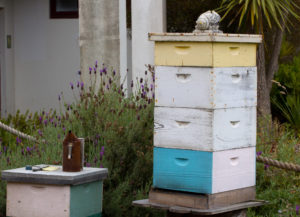 Both my grandmothers were amazing women in their own right. Both had traveled long distance when they were young ladies and were very independent, especially considering the times they grew up in. It is no wonder that I named my daughter after them in hopes that their spirits would inspire her.
Both my grandmothers were amazing women in their own right. Both had traveled long distance when they were young ladies and were very independent, especially considering the times they grew up in. It is no wonder that I named my daughter after them in hopes that their spirits would inspire her.
My dad’s mom, Yvonne came from Hemphill, Texas. It is a small town north-east of Houston, small at least when I visited there with her. It was much smaller when she was growing up. She would talk about home with all her brothers and sisters and all the neighbor kids playing together, and she made it sound like heaven. I remember all the little bits of Texas she brought with her to Massachusetts. Thanks to her, I love grits with butter and a little salt and pepper. She used to grow red chili peppers to hang for decoration, quite the rarity at that time and place. She would warn me not to eat them because they were too hot. I promised her I wouldn’t eat them but I didn’t say anything about feeding them to others. It turns out they were quite hot and I would loose a friend until we found someone else to eat one.
When I was just barely a teen we took a road trip down the east coast camping and went back to my Grandmother’s childhood home. It was amazing. I had never seen so much flat earth. We thought the driving was bad, especially for truckers, because we kept seeing long strips of tire on the road. Then my dad stopped and look closer and realized they were snakes that got run over. He never took off his boots after that, even sleeping.
I met family I didn’t know, and they were warm and welcoming. So were their neighbors. And strangers, if you could call someone that friendly a stranger. We did some tourist stuff, and, God, the steaks were amazing. But the best part for me was when I got to get up bright and early and go feed a bottle to a baby calf. I was covered in dirt and slobber soon enough, and it was awesome.
One of the things I thought was the strangest was how comfortable people there were with poisonous things like swimming in a river with water moccasins. The elders got together and talked about the last time it flooded, how they found three rattlesnakes in the chair I was sitting in. Don’t get me started on fire ants. Or flying giant cockroaches.
Texans are tough, they are sweet, and strong, and wonderful. Family means a lot. We drifted apart after that trip, lost any touch when my grandmother passed. But the events of this week makes think of all those people, all those Texans. So, from a granddaughter of a Texan, please keep yourself safe and I am sending as much sunshine from CA as I can and all my best thoughts.
Along with what money we can spare. Cause we are all part of the American family. And that’s what family does.
Google is matching any donations, but it does go to the Red Cross eventually.
Texas Monthly – Here Are Ways You Can Help People During Hurricane Harvey
Hurricane Harvey: Here’s How to Help
Have a good day, keep safe
Paula
Save
 Why is it so many new novels are—to be blunt—crap? How can we find an author we love with one book, then all the love goes away with the next? What’s going wrong? What’s missing? Where did everything go wrong?How can we learn and do better?
Why is it so many new novels are—to be blunt—crap? How can we find an author we love with one book, then all the love goes away with the next? What’s going wrong? What’s missing? Where did everything go wrong?How can we learn and do better?

 I have Addison’s second type, like J. F. Kennedy but a little different. His was the first type. Basically due to doctors error a long time ago my adrenal glands are totally fried. It took an incredibly long time to get diagnosed but here I am trying to work my program. So one of the issues is I have a shit ton of inflammation which means, happy fun time, I get to go on the inflammation diet. So today I spent the day making my own homemade flax seed cereal for breakfast and preparing kale. I f’ing hate kale. The only thing that I hate worse than kale is kale with shitake mushrooms. If you just said “Oh that sounds yummy” then (1) I probably hate you too, and (2) please come eat mine for me.
I have Addison’s second type, like J. F. Kennedy but a little different. His was the first type. Basically due to doctors error a long time ago my adrenal glands are totally fried. It took an incredibly long time to get diagnosed but here I am trying to work my program. So one of the issues is I have a shit ton of inflammation which means, happy fun time, I get to go on the inflammation diet. So today I spent the day making my own homemade flax seed cereal for breakfast and preparing kale. I f’ing hate kale. The only thing that I hate worse than kale is kale with shitake mushrooms. If you just said “Oh that sounds yummy” then (1) I probably hate you too, and (2) please come eat mine for me. This question single-handedly turned around my writing career. It has become the first thing I ask my characters as I devise new and better ways to torture them along the road to their happily-ever-after. First, though, let me give credit where credit is due.
This question single-handedly turned around my writing career. It has become the first thing I ask my characters as I devise new and better ways to torture them along the road to their happily-ever-after. First, though, let me give credit where credit is due. Have you ever read about something, and then was so excited to try it someday? For me, it was Turkish Delight and then mead. So many of my childhood stories extolled the delight of Turkish candy. Even in The Chronicles of Narnia series, it was a treat among treats, that the White Witch tempted Edmund with. So it has to be good, right? Have you tasted it? First of all, it smells like roses and I love roses. But it is very sticky and too sweet (and I like sweets!) and it tastes like your grandmothers rose soap. My son will eat it but then again, he likes Haggis so there is no accounting for taste.
Have you ever read about something, and then was so excited to try it someday? For me, it was Turkish Delight and then mead. So many of my childhood stories extolled the delight of Turkish candy. Even in The Chronicles of Narnia series, it was a treat among treats, that the White Witch tempted Edmund with. So it has to be good, right? Have you tasted it? First of all, it smells like roses and I love roses. But it is very sticky and too sweet (and I like sweets!) and it tastes like your grandmothers rose soap. My son will eat it but then again, he likes Haggis so there is no accounting for taste.
 Do you lucid dream or have a dream journal? I have always had an interesting dream life and have solved problems in my sleep, but I don’t think I can actually have a lucid dream. But if you can remember your dreams, make sure you take note, for they are surely telling you something you need to hear. If you wake up and can remember what you were dreaming about it is helpful to write it down immediately. Google has plenty of tips on how to remember your dreams better.
Do you lucid dream or have a dream journal? I have always had an interesting dream life and have solved problems in my sleep, but I don’t think I can actually have a lucid dream. But if you can remember your dreams, make sure you take note, for they are surely telling you something you need to hear. If you wake up and can remember what you were dreaming about it is helpful to write it down immediately. Google has plenty of tips on how to remember your dreams better. by Angela Ackerman
by Angela Ackerman
 by Duncan M. Hamilton
by Duncan M. Hamilton
 I have noticed that there are different types of personalities and different ways that people interact on Facebook.
I have noticed that there are different types of personalities and different ways that people interact on Facebook. I just finished a book, one I won’t name because I don’t want to be mean. The problem is that the book was really good, at least for the first half. You could tell where the writer either had a deadline or just gave up. I hate that.
I just finished a book, one I won’t name because I don’t want to be mean. The problem is that the book was really good, at least for the first half. You could tell where the writer either had a deadline or just gave up. I hate that. By
By  Both my grandmothers were amazing women in their own right. Both had traveled long distance when they were young ladies and were very independent, especially considering the times they grew up in. It is no wonder that I named my daughter after them in hopes that their spirits would inspire her.
Both my grandmothers were amazing women in their own right. Both had traveled long distance when they were young ladies and were very independent, especially considering the times they grew up in. It is no wonder that I named my daughter after them in hopes that their spirits would inspire her. A few months ago, I started a new pen-name and have kept it secret in order to avoid ‘pollution’ of the also-boughts. But it has been SO hard because I have basically started from scratch – with no email list, no street team, no reviews, no platform, no social media.
A few months ago, I started a new pen-name and have kept it secret in order to avoid ‘pollution’ of the also-boughts. But it has been SO hard because I have basically started from scratch – with no email list, no street team, no reviews, no platform, no social media.